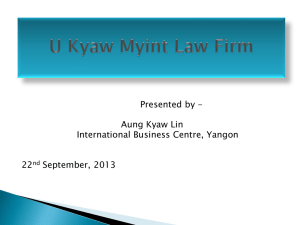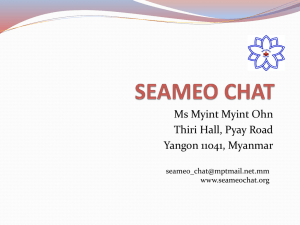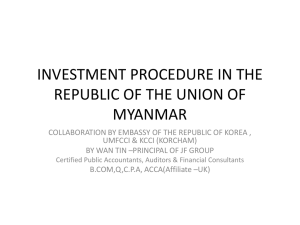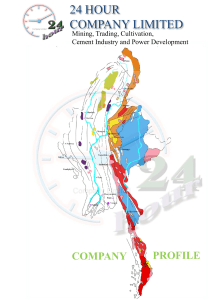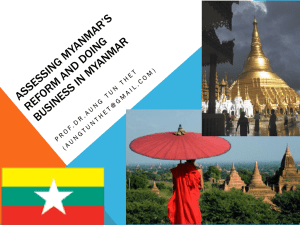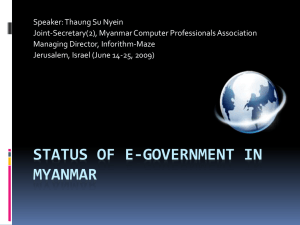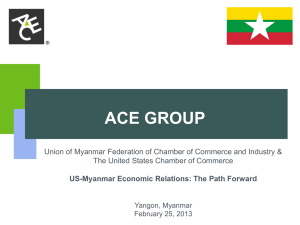Banking and Financial Reforms in Myanmar
advertisement
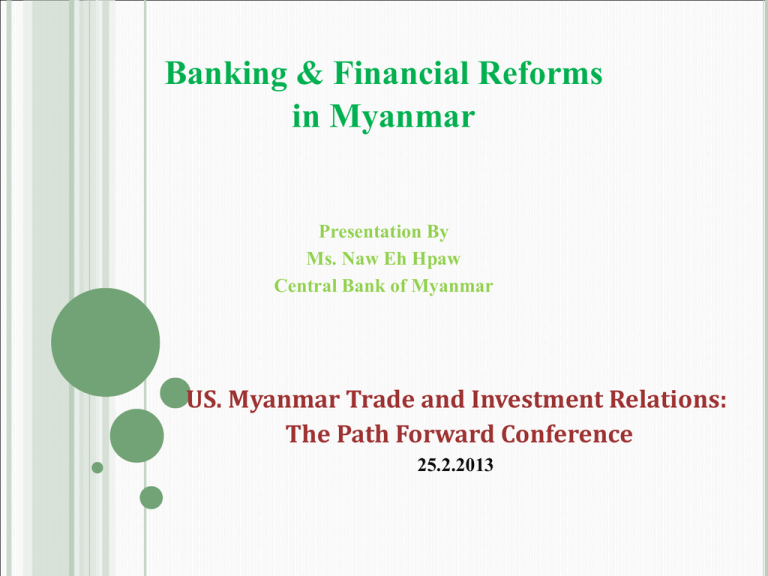
Banking & Financial Reforms in Myanmar Presentation By Ms. Naw Eh Hpaw Central Bank of Myanmar US. Myanmar Trade and Investment Relations: The Path Forward Conference 25.2.2013 CONTENTS I. CURRENT STATUS II. REFORM III. ISSUES AND CONSTRAINTS IV. PAYMENT SYSTEM DEVELOPMENT IN MYANMAR V. 2 CONCLUSION CURRENT STATUS Financial Sector plays an important role in economic development of a country. The Central Bank of Myanmar is the regulatory and supervisory authority of the financial sector in Myanmar. Myanmar’s banking sector comprises the Central Bank of Myanmar, 4 state-owned banks, 19 domestic private banks and 28 foreign bank representative offices. (Attached - A) Following a change of government in 1988 and adoption of a market-oriented policy by the government, the structure of financial institutions was transformed by new bank laws passed in 1990. 3 Attached-A: Financial system structure in Myanmar Central Bank of Myanmar Joint venture banks State-owned banks 1. Myanma Economic Bank 2. Myanma Foreign Trade Bank 3. Myanma Investment and Commercial Bank 4. Myanma Agricultural Development Bank Privately- owned banks Representative Offices of foreign banks 1. Yadanabon Bank Ltd. 2. First Private Bank Ltd. 3. Yoma Bank Ltd. 4. Myanmar Oriental Bank Ltd. 5. Tun Foundation Bank Ltd. 6. Kanbawza Bank Ltd. 7. Asian Yangon Bank Ltd. 8. Rural Development Bank Ltd. 9. Innwa Bank Ltd. 10. Myanma Livestock and Fisheries Development Bank Ltd. 11. Small & Medium Industrial Development Bank Ltd. 12. Myawaddy Bank Ltd. 13. Myanmar Citizens Bank Ltd. 14. Yangon City Bank Ltd. 15. Co-operative Bank Ltd. 16. Asia Green Development Bank Ltd. 17. Ayeyarwaddy Bank Ltd. 18 United Amara Bank Ltd. 19. Myanmar Apex Bank Ltd. 1. DBS Bank Ltd. 2. United Overseas Bank Ltd. 3. Oversea-Chinese Banking Corporation Ltd. 4. Malayan Banking Berhad (MAYBANK), Malaysia 5. Bangkok Bank Public Company Ltd. 6. National Bank Ltd. 7. Brunei Investment Bank (BIB) 8. First Overseas Bank Ltd. 9. First Commercial Bank, Singapore Branch 10. CIMB Bank Berhad 11. Sumitomo Mitsui Banking Corporation 12. The Bank of Tokyo-Mitsubishi UFJ, Ltd. 13. Bank for Investment and Development of Vietnam 14. AB Bank Limited 15. Industrial and Commercial Bank of China Ltd. 16. Mizuho Corporate Bank Ltd. 17. Siam Commercial Bank Public Company Ltd. 18. MARUHAN Japan Bank PLC 19. Krung Thai Bank Public Company Ltd. 20. United Bank of India 21. KASIKORNBANK Public Company Ltd. 22. AEON Credit Service Company 23. Hana Bank 24. Woori Bank 25. ANZ Bank 26. Vietin Bank 27. Korea Development Bank 28. Standard Chartered Bank 4 REFORM Myanmar has implemented important reforms and liberalization in financial services sector since the new civilian government took up office in April 2011. Central Bank of Myanmar took the first step toward the country’s exchange rate system from the fixed exchange rate system to a managed float regime in early April 2012 with the IMF’s Technical Assistance. The exchange rate has remained stable, with a slight appreciation against the United States dollar (See. Figure-1). 5 Figure 1. Monthly Average Exchange Rates of USD/MMK from November 2012 to January 2013 MMK 900.00 MMK 880.00 MMK 860.00 USD/MMK MC Purchase MMK 840.00 MC Sell Informal Market Rate Purchase Informal Market Rate Sell MMK 820.00 MMK 800.00 MMK 780.00 6 MMK 760.00 Nov 2012 Dec 2012 Jan 2013 “(CONT.)” CBM has also initiated the daily foreign exchange auction in which authorized dealer banks can participate as counterparties. Myanmar maintains a multiple currency practice subject to Fund approval under Article VIII, Section 3. In the circumstances of Myanmar, the Fund grants approval of the retention of the multiple currency practice until January 10, 2014 or the conclusion of the next Article IV consultation with Myanmar, whichever is earlier. 7 “(CONT.)” Central Bank of Myanmar has granted the money changing business licenses to the private banks since October 24, 2011 and there are (110) money changing counters across the country at present. CBM has also granted the authorized dealer licenses to the private banks to inaugurate an interbank foreign exchange market since November 25, 2011 and the currency remittance services to the private Authorized Dealer banks. The eligible private banks have performed the currency remittance operations for Myanmar Citizens working abroad. 8 “(CONT.)” M.C counters shall buy and sell up to USD 10,000 and equivalent foreign currency (EUR, SGD) without asking for reasons and documents. CBM has permitted the authorized dealer banks to maintain the foreign currency accounts for foreign banking services since July 9, 2012. The Foreign Exchange Management Law was enacted on 10th August 2012. This Law removes all exchange restrictions and eliminates multiple currency practices. Regarding to exercise the FEML (2012), the regulation for the FEML is being drafted with the IMF T.A. 9 “(CONT.)” Myanmar quickly is moving to establish a market based exchange system. An initial step is to adjust the exchange rate at least the prevailing market rate and continue to adjust the rate in light of developments in the informal market. In order to establish Yangon Foreign Exchange Market, the committee was formed comprises of officials from private banks and Central bank of Myanmar. The Code of Conduct for Yangon Foreign Exchange Market Committee is being drafted. 10 ISSUES AND CONSTRAINTS There were no private banks before 1988. Due to this situation, people are not much familiar with foreign exchange market. We may not rapidly materialize to develop foreign exchange market without cooperation of public companies and private banks. The most important thing is to build up people’s trust: to encourage the public private sector which willing to invest and work especially in Financial Sector. Informal market is bigger than formal market for many years in Myanmar. 11 “(CONT.)” 3 Phases for banking sector Development roadmap : Phase (1) 2008-2009, to encourage establishing public Companies. Phase (2) 2010-2012, to promulgate securities law, Rules and Regulations. Phase (3) 2013-2015, to make the linkage ASEAN Stock Exchange Center. Tokyo Stock Exchange (TSE) and Daiwa Institute of Research Ltd (DIR) are providing advice for development of financial and capital market in Myanmar. 12 “(CONT.)” Phases for banking sector Development strategy : Phase (1) ; Domestic Private Banks to run joint venture banks with foreign banks Phase (2) ; Permitting Foreign Banks to establish locally incorporated 100% owned subsidiary. Phase (3) ; Permitting Foreign Banks to open branches. 13 PAYMENT SYSTEM DEVELOPMENT IN MYANMAR As Central Bank of Myanmar is responsible for the development of efficient, fast, safe and reliable national payment system, (i) Central Bank of Myanmar Law, (ii) Law for Financial Institutions and (iii) Regulations for Financial Institutions are being applied. Central Bank of Myanmar has implemented to improve non-cash payment systems : (1) Implementing of Banking network, Auto Clearing System and Electronic Fund Transfer. (2) Establishment of Myanmar Payment Union (MPU) for 14 merchant based retail payment. “(CONT.)” Central Bank of Myanmar will carry out the Automatic Clearing System House (ACH) and Real Time Gross Settlement System (RTGS) in 2013~2014 and 2014~2015 with the support of JICA and IMF T.A Myanmar Payment System Development Committee is already set up the Electronic Fund Transfer (EFT) and it is still proceeding to complete process. After it was completed CBM will link to external network through National Switch. 15 “(CONT.)” CBM encouraged cash payment by using debit card and till now 180,000 MPU cards are already issued. MPU is implementing for acquiring process for international cards. MPU makes efforts to acquire the international card with Myanmar Kyat in 2013 which intends to SEA Game. 16
